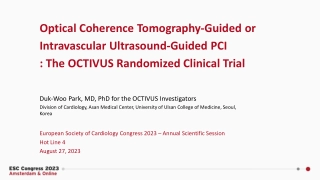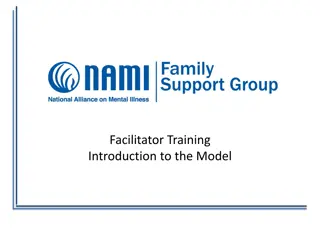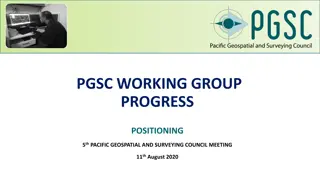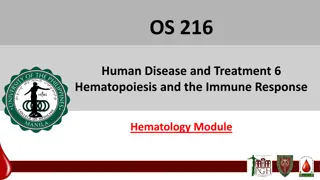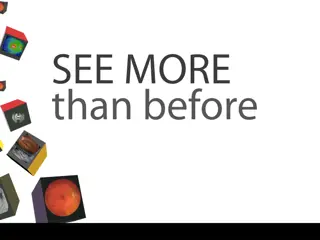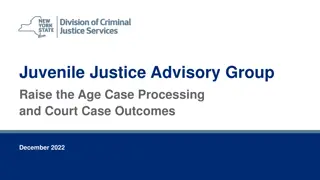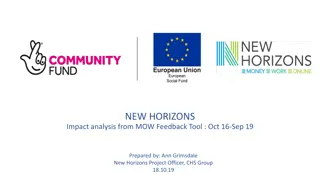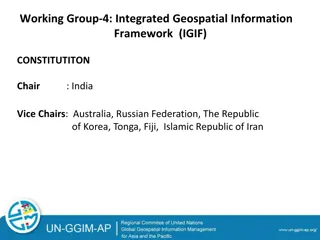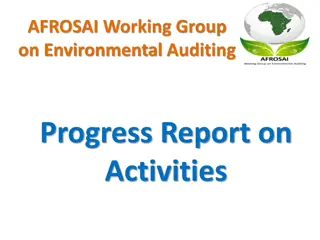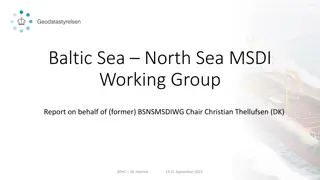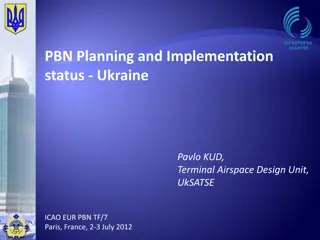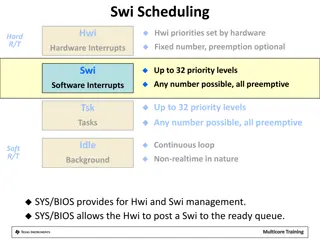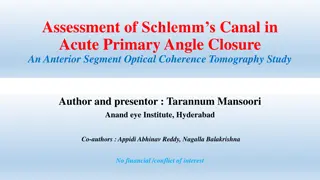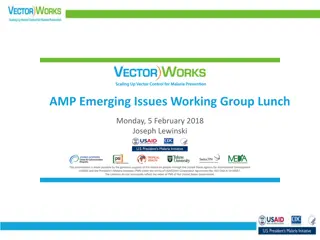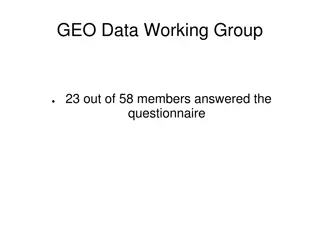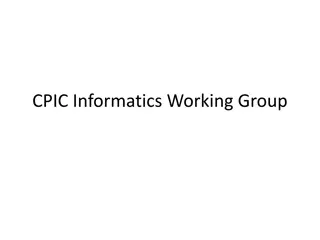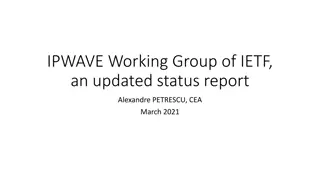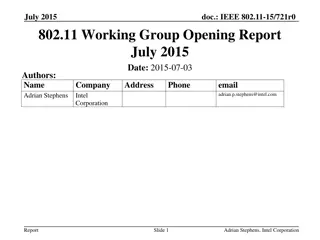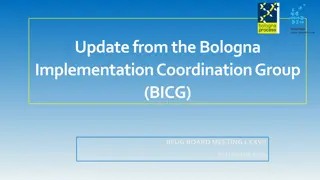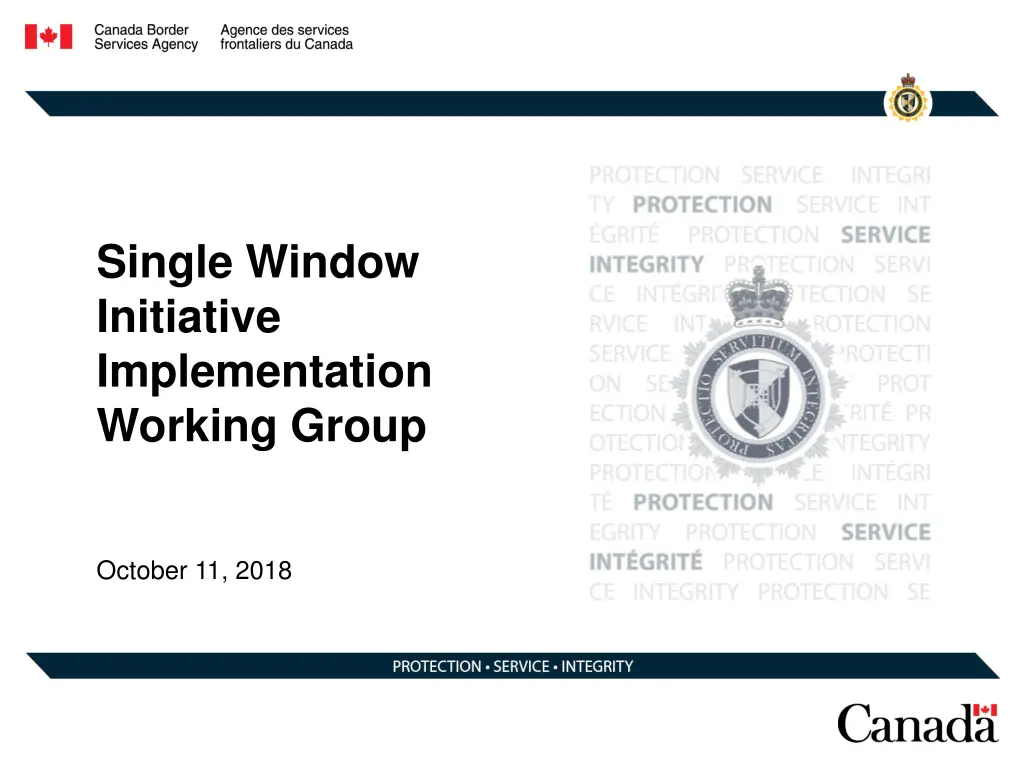
Single Window Initiative Summary
Stay informed about the latest updates on the Single Window Initiative Implementation Working Group meeting held on October 11, 2018. Learn about SWI onboarding progress, IID volumes update, PGA transactions summary, system/policy issues status, and updates from Health Canada and the Canadian Food Inspection Agency.
Uploaded on | 2 Views
Download Presentation

Please find below an Image/Link to download the presentation.
The content on the website is provided AS IS for your information and personal use only. It may not be sold, licensed, or shared on other websites without obtaining consent from the author. If you encounter any issues during the download, it is possible that the publisher has removed the file from their server.
You are allowed to download the files provided on this website for personal or commercial use, subject to the condition that they are used lawfully. All files are the property of their respective owners.
The content on the website is provided AS IS for your information and personal use only. It may not be sold, licensed, or shared on other websites without obtaining consent from the author.
E N D
Presentation Transcript
Single Window Initiative Implementation Working Group October 11, 2018
Agenda Welcome Industry Participants Canada Border Services Agency Introductions SWI Onboarding and IID Volumes Update PGA Transactions August 2018 SWI IID System/Policy Issues Status Updates Transactional SWI IID Q & As Testing and Certifying for the SWI IID Q & As Roundtable 2
SWI Onboarding and IID Volumes Update August 1 - 31, 2018: 189 (184) trade chain partners (TCPs) have completed the testing for SWI and of these 170 (162) are certified to submit the IID. 64 different TCPs utilized the SWI IID release service option compared to 63 in July 2018. There were 101,037 SWI IID transactions compared to 80,441 in July 2018. 80% of SWI IID transactions were processed within 15 minutes, 4% between 16-30 minutes, 4% between 31-60 minutes, and 11% over 61+ minutes. 54% of the SWI IID transactions were for non-regulated goods (i.e. no PGA decision required), which is unchanged from July 2018. SWI IID transactions represented 17% of all OGD EDI releases compared to 14% in July. 3
PGA Transactions August 2018 PGA Number of IID Transactions CFIA ECCC GAC NRCAN TC HC PHAC CNSC DFO NO PGA (Non Regulated) Note: The transactions noted will add up to more than 101,037 because some transactions were processed by more than one PGA. 22,902 4,072 4,467 12,930 3,525 2,880 0 22 14 54,572 4
SWI IID System/Policy Issues Status Update 5
HEALTH CANADA Issue: Health Canada reference tables are not being updated. This includes data for NOL control #, 5016 Class B Precursor License, 5010 Drug Establishment License, 5022 NHP Site License, and 5001 Establishment Licence. Status Update: Health Canada is working to resolve this issue. There is no ETA on when this will be completed. Issue: Trade chain partners are having a difficult time understanding why LOT # is required for the IID submission. They asked CBSA/HC to reconsider this data element and Health Canada agreed to change LOT # from being a mandatory data element to an optional one and the IT request to make this change is being processed. Status Update: The CBSA is aiming to have this functionality in place by December 2018. 6
CANADIAN FOOD INSPECTION AGENCY Issue: CFIA AIRS Registration 76 (Fish Import Licence) and 96 (Approved Ministerial Exemption with Signature) cannot be submitted via the IID. Status Update: CFIA is continues to target end of October to resolve this issue. Issue: A 4B9 error message along with free-text message is being generated in instances where an IID matches with the CFIA but contains multiple GAGIs, including one that does not contain any CFIA-regulated commodities. This error message results in the port needing to cancel the transaction and to revert to a legacy service option (OGD PARS, OGD RMD or Paper). CFIA Multiple countries of Origin (GAGI) where not all lines have CFIA data. These get rejected from CFIA categorically. Status Update: CFIA is continues to target end of October to resolve this issue. 7
CANADIAN NUCLEAR SAFETY COMMISSION Issue: There are still a number of legacy permits which still do not contain an associated BN number in the reference data provided to the CBSA by the CNSC. As such, if a TCP quotes any of these legacy permits on their IID, the client will receive a reject. Status Update: CNSC advised that the BN update is ongoing. As licensees provide the information the licensing database is being updated to include the BN. They are also determining the most efficient way to make sure the legacy permit BNs are updated when the data is not automatically transferred. 8
CANADA BORDER SERVICE AGENCY Issue: The CBSA has identified a sequencing issue that happens when a CFIA reject is received and when the TCP resubmits the data, the IID remains in a pending CFIA decision status. Status Update: The first portion of this fix was implemented in September and the CBSA intends to have the next portion of the fix implemented by the end of October or early November. 9
Issue: The CBSA has identified a system limitation that relates to Participating Government Agencies (PGAs) that have various PGA Exception Processes for their programs. Currently, IID segment SG13.RCS is used for this purpose but it is limited in its use because when a PGA exception code is supplied at SG13, it applies to the entire declaration. As a result, if a shipment contained multiple regulated commodities with different PGA Exception Processing Codes brokers/importers would not be able to submit the required data in a single SWI IID submission. Example: Transport Canada s (TCs) Vehicle Program A broker/importer wants to import two vehicles using TC s Appendix G Program and part for a trailer (in this example a jack) that is not regulated. They would enter a PGA Exception Process Code (TC05) for the two vehicles and this code would then apply to all commodities in the declaration and they will receive a reject. Again, the only way this transaction could be processed via the SWI IID is if the regulated and unregulated commodities were declared separately. Status Update: The CBSA has begun the Request for Change (RFC) process which is currently being impacted by CBSA IT (no change). 10
NATURAL RESOURCES CANADA EXPLOSIVES PROGRAM Issue: Has the reference data for NRCan Explosives been updated yet? NRCan has agreed to change the SWI requirements and will be removing two data elements, which are: Commodity Description (Trade Name) / Authorized Product Name SG117, IMD, (Q) 7081, (E) 7008 Manufacturer/ Commodity Party (Registering Party) / Person who obtained Product Authorization) SG119, NAD, (Q) 3035, (E) 3036 In addition, the Commodity Identifier (Product ID) / Authorized Product Identifier, SG117, GIN, (Q) 7402, 2, (E) 7402, 3 will become a mandatory data element (it is currently conditional). Status Update: The CBSA is aiming to have this functionality in place by December 2018. 11
ENVIRONMENT AND CLIMATE CHANGE CANADA VEHICLE AND ENGINE EMISSIONS PROGRAM Issue: Addition of a compliance statement to ECCC s Vehicle and Engine Emissions Program to enable brokers/importers to declare vehicles and/or engines that are not regulated. Note: Brokers/importers wishing to import goods that are included in ECCC s Data Element Matching Criteria Tables but are not regulated as a result of an exclusion or exception should NOT be submitted via the SWI IID; a legacy release service option should be used instead. For example: Off-road recreational vehicle with an electric motor (HS Code 8704.90.00.00) electric motors are not regulated by ECCC. Recoil starters (HS Code 8412.80.00.00) individual (loose) parts are not regulated by ECCC (i.e. this is not a complete engine). Snow Plow Blades (HS Code 8430.20.00.90) individual parts are not regulated by ECCC. These instructions do not apply to goods that are regulated by ECCC. Status Update: CBSA IT is in the process of impacting this Request for Change (RFC). 12
Issue: When brokers/importers are submitting Health Canada transactions using the IID, they are not submitting the entry correctly, which is resulting in increased non-compliance. It is imperative that these entries are submitted correctly to ensure that all PGA requirements are met. Health Canada entries match on three criteria, which are: HS Code + Intended Use Code + Canadian Product Category Code If a broker/importer enters one of these data elements incorrectly then the shipment will not be processed correctly. This could result in a broker/importer receiving an Administrative Monetary Penalty (C005) for not providing the CBSA with true and accurate information on their declaration. A complete listing of available Health Canada combinations, by Program, is available on GCcollab. Alternatively, brokers/importers can send an email to: CBSA.SW_Program-Programme_Du_GU.ASFC@cbsa-asfc.gc.ca and request a copy to be emailed to them. 14
Testing and Certifying for the SWI IID Qs and As 15
Question/Issue: When an importer/broker obtains a release for MEAT using the SWI IID, how does the importer/broker obtain the MCAPS report? Today the importer/broker gets the MCAP faxed over by CFIA/NISC and this sent to WHSE so that CFIA MEAT inspector can complete their inspection and release goods to importer of record consignee Not sure how this all works under SWI any input? Response: The importer/broker will continue to receive MCAP for Shell Egg and Offshore Meat in exactly the same manner as they do currently via OGD/PARS. This part of the process is not currently identified to change. 16
Roundtable 17
Patricia Claeys Manager, Other Government Departments Unit Patricia.Claeys@cbsa-asfc.gc.ca 18

